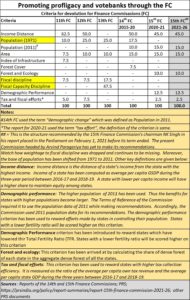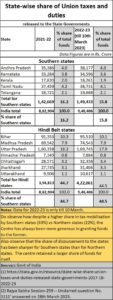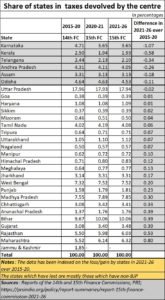The dangers of the Finance Commission becoming weak
By RN Bhaskar
The Bing generated image shows a supplicant picking up crumbs before a wealthy man who keeps much of the moolah for himself. But, in the background, there are bandits who have have already broken into the vault and have begun looting it. The picture could be quite representative of what is happening in India today.
To appreciate this state of affairs, one has to see what is happening with the Finance Commission (FC). One must also examine why many states believe that they are being discriminated against by the Centre. It is also important to know that the share of money some states used to get from the centre from the collective pool of taxes, has diminished. Moreover, states that are known to be big revenue generators, believe that they are not getting a fair share of the money that was generated in their respective states, and the money is given to states favoured by the central government.
First, there is no doubt that the FC appears to have lost its moral and social bearings. Consider a chart, sourced from PRS Legislative Research (https://prsindia.org/policy/report-summaries/report-15th-finance-commission-2021-26).
It shows quite clearly the manner in which three key parameters were dispensed with.
The first is the decision to consider all financial devolutions on the basis of state populations as given by Census 2011 instead of the earlier requirement to use 1971 as the base year. Effectively, states that did not control their populations from 1971 to 2011 were given a clean chit, with no penalty points.
The second the third parameters that were actually junked are – “Fiscal discipline” and “Fiscal Capacity Discipline”. Effectively, it allowed the FC to permit the government to disburse funds to states which were financially profligate. It is an inviation to the squandering of funds, and throwing to the winds all sense of financial discipline.
This has serious ramifications because as PRS Legislative Research points out (https://prsindia.org/policy/report-summaries/report-15th-finance-commission-2021-26), “The Finance Commission is a constitutional body formed (under Article 280 of the Indian Constitution) by the President of India to give suggestions on centre-state financial relations. , . . The 15th Finance Commission (Chaired by N. K. Singh) was required to submit two reports. The first report, consisting of recommendations for the financial year 2020-21, was tabled in Parliament in February 2020. The final report with recommendations for the 2021-26 period was tabled in Parliament on February 1, 2021.”
The members of the new FC were announced by the government in January 2024. Prior to that, “the Terms of Reference (ToR) for the New Finance Commission were notified by way of a press release dated 29 November 2023” (https://www.ey.com/en_in/tax/economy-watch/16-th-finance-commission-the-benefits-of-brevity-in-terms-of-reference). The Commission, stated the press release “shall make its report available by 31st day of October 2025 covering a period of five years commencing on the 1st day of April 2026.” (https://pib.gov.in/PressReleaseIframePage.aspx?PRID=1980688).
The big question is whether the new FC will have the spine to restore the Criteria for financial devolution and reintroduce the three parameters that were junked.
The seriousness of the situation was highlighted to several chief ministers of southern states by EAS Sarma, former secretary to the Government of India, and currently a social activist focussed on key issues relating to the Indian Constitution.
On 11 February, 2024, EAS Sarma wrote to all the chief ministers of India (https://asiaconverge.com/2024/02/misuse-of-article-282-of-the-constitution-by-the-centre/) about the “misuse of Article 282 of the Constitution by the Centre to marginalise the political space of States.” Fiscal injustice he added is the consequent harm caused to states.
He wrote about how “The Karnataka Chief Minister, accompanied by the State’s legislators, has registered a loud protest in Delhi against the Centre’s “fiscal injustice.” Kerala has lost no time in extending its support to Karnataka. They contend that the devolution of central taxes to their two respective States has declined over the years. The devolution of the Central taxes in the case of the five southern States, namely, Andhra Pradesh, Telangana, Tamil Nadu, Karnataka, and Kerala, came down from 18.62% in 2014-2015 to 15.8% in 2021-2022 (https://www.deccanherald.com/opinion/tax-southern-states-protests-karnataka-tamil-nadu-kerala-fiscal-injustice-2887606).”
It may be recalled that just a fortnight ago, Tamil Nadu threw its gauntlet in the ring, by passing resolutions in its state assembly against the Centre’s move to reduce its constitutional clout (https://bhaskarr.substack.com/p/the-battle-for-constitutional-voice?r=ni0hb&utm_campaign=post&utm_medium=web&triedRedirect=true).
Even earlier, on 24 August 2021, EAS Sarma wrote a letter (https://asiaconverge.com/2021/08/delimitation-of-indian-states-and-rewarding-the-hindi-belt/) to some of the chief ministers of Southern states in India warning of grave injustice that was being meted out to their states by norms that were being implemented by the Finance Commission: “In the case of the European Union where a similar problem had been encountered, the European nations adopted the “principle of degressive proportionality” which implies that some weightage is given to declining population growth rates etc. resulting from policy measures of the respective governments. The Delimitation Commissions should adopt a similar approach in India.”
The fact is that the share of finances once given to the states has been rapidly shrinking. The share of the Centre has increased. That, in turn, corrodes the federal structure of the country.
If the total pool has been shrinking, it is worse for many non-BJP ruled states, which have seen their shares in the smaller kitty shrink.
Even when it comes to an enlarged kitty for the Centre, it is obvious that much of the money is now being used for discretionary grants to favoured states. The Centre accounts for the largest share among the various heads under which funds get allocated.
Since the government has almost total discretion over which local government should get these grants, it is not surprising that the largest projects have been announced for Uttar Pradesh. These include the Ganga Freeway, The Ram Mandir (https://bhaskarr.substack.com/p/what-after-the-ram-mandir?sd=pf), he Kashi and Mathura Temples, the city development funds for Kanpur and Mathura. The eastern dedicated freight corridor (https://bhaskarr.substack.com/p/indias-two-dfcs-politics-trounces?r=ni0hb&utm_campaign=post&utm_medium=web&triedRedirect=true). . . The list could be quite long.
It will not be surprising, therefore, if Uttar Pradesh actually shows a surplus budget and is declared once again by Niti Aayog as one of the most progressive states. It has done this before (https://asiaconverge.com/2021/08/the-fanciful-figures-of-uttar-pradesh/), despite its poor, undeclared surge in Covid deaths.
Consider its poor record on the safety of women, even schoolgirls who are in child care institutions (CCIs). It remains the only state in India which has not submitted itself to inspections of its Child Care Institutions, despite a Supreme Court directive in 2013 (https://asiaconverge.com/2021/07/hindi-belt-ii-crimes-against-children-and-against-humanity/). This state continues to get grants and attention notwithstanding the several high-profile rapes since then. Even the Ministry for Women and Child Development isn’t bothered (https://twitter.com/rnbhaskar1/status/1383705744822833156?s=20).
The problem comes back to the three parameters that were dropped. In fact, there were very compelling reasons for the weightages for the three dropped parameters to be increased. Instead, they have been dropped. Made irrelevant.
That raises one fundamental question – If there is no weightage or overriding concern for financial discipline or probity, should the government be trusted with funds at all? Isn’t it better for states that generate the funds to keep all of it?
Arvind Panagariya, who heads the Finance Commission has a big job ahead of him. Let’s see what he does.









































COMMENTS